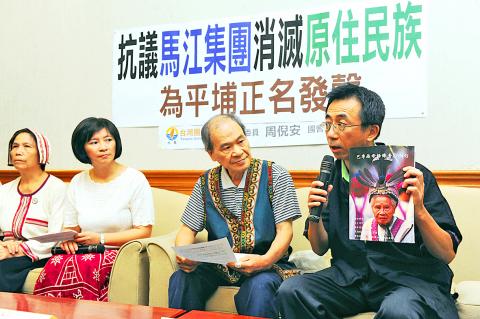Pingpu Aboriginal activists yesterday demanded that the government immediately grant official recognition to Pingpu tribes, saying that their aim is not to take a share of already scarce state resources allotted to Aboriginal matters, but to be recognized as Aborigines.
“We Pingpu Aboriginal tribes have our own cultures and languages. There’s no reason for the Council of Indigenous Peoples to refuse to grant us official recognition as Aborigines,” Taiwan Association for Rights Advancement for Pingpu Plains Aboriginal Peoples chairman Jason Pan (潘紀揚) of the Pazeh people told a news conference at the legislature yesterday.
Pan said the council has previously expressed concern that if granted recognition, Pingpu Aborigines may take too many resources from the other officially recognized Aboriginal groups, but stressed that “this is not the point.”

Photo: Lo Pei-der, Taipei Times
“We don’t mean to take a share of the resources; we just want to be recognized for who we are,” he said.
Pan said that despite the council’s repeated promises to grant them official recognition, first made more than six years ago, nothing has been done so far.
Kaxabu Aborigine Pan Pao-feng (潘寶鳳) said the Kaxabu language is closely related to the language of the Saisiyat and the Atayal, which are both officially recognized Aboriginal communities.
“Linguistic studies show that the Kaxabus are part of the Austronesian family in Taiwan. It makes no sense that while Saisiyats and Atayals are recognized, we are not,” Pan Pao-feng said.
“The Kaxabu language has been classified by UNESCO as an endangered language; the language and culture may eventually become extinct without an official status,” Pan Pao-feng said.
The Pingpus are Aborigines who traditionally lived in the lowland areas of Taiwan.
Advocates say that their cultures and languages have been severely threatened through their close and frequent interaction with Han people, warning that many tribes having already lost their identities, while others, including the Siraya, Pazeh, Kaxabu and Ketagalan, are struggling to gain official status as Aborigines.
The council did not directly address the call for official recognition, but it issued a press statement defending the administrative practice to separate “Aborigines” and “Pingpus” as a historic one, since it has been in place since the Qing Dynasty.
It said that despite not granting Pingpus official recognition, the council has put a lot of effort into protecting and preserving their cultures and languages.

The CIA has a message for Chinese government officials worried about their place in Chinese President Xi Jinping’s (習近平) government: Come work with us. The agency released two Mandarin-language videos on social media on Thursday inviting disgruntled officials to contact the CIA. The recruitment videos posted on YouTube and X racked up more than 5 million views combined in their first day. The outreach comes as CIA Director John Ratcliffe has vowed to boost the agency’s use of intelligence from human sources and its focus on China, which has recently targeted US officials with its own espionage operations. The videos are “aimed at

STEADFAST FRIEND: The bills encourage increased Taiwan-US engagement and address China’s distortion of UN Resolution 2758 to isolate Taiwan internationally The Presidential Office yesterday thanked the US House of Representatives for unanimously passing two Taiwan-related bills highlighting its solid support for Taiwan’s democracy and global participation, and for deepening bilateral relations. One of the bills, the Taiwan Assurance Implementation Act, requires the US Department of State to periodically review its guidelines for engagement with Taiwan, and report to the US Congress on the guidelines and plans to lift self-imposed limitations on US-Taiwan engagement. The other bill is the Taiwan International Solidarity Act, which clarifies that UN Resolution 2758 does not address the issue of the representation of Taiwan or its people in

US Indo-Pacific Commander Admiral Samuel Paparo on Friday expressed concern over the rate at which China is diversifying its military exercises, the Financial Times (FT) reported on Saturday. “The rates of change on the depth and breadth of their exercises is the one non-linear effect that I’ve seen in the last year that wakes me up at night or keeps me up at night,” Paparo was quoted by FT as saying while attending the annual Sedona Forum at the McCain Institute in Arizona. Paparo also expressed concern over the speed with which China was expanding its military. While the US

SHIFT: Taiwan’s better-than-expected first-quarter GDP and signs of weakness in the US have driven global capital back to emerging markets, the central bank head said The central bank yesterday blamed market speculation for the steep rise in the local currency, and urged exporters and financial institutions to stay calm and stop panic sell-offs to avoid hurting their own profitability. The nation’s top monetary policymaker said that it would step in, if necessary, to maintain order and stability in the foreign exchange market. The remarks came as the NT dollar yesterday closed up NT$0.919 to NT$30.145 against the US dollar in Taipei trading, after rising as high as NT$29.59 in intraday trading. The local currency has surged 5.85 percent against the greenback over the past two sessions, central